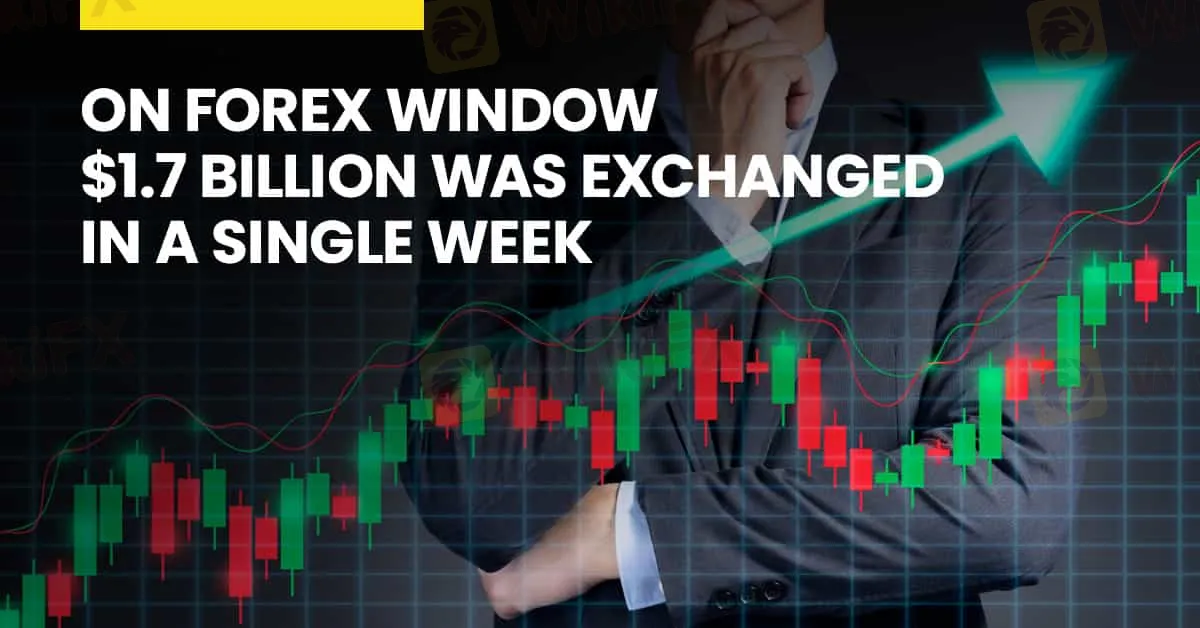简体中文
繁體中文
English
Pусский
日本語
ภาษาไทย
Tiếng Việt
Bahasa Indonesia
Español
हिन्दी
Filippiiniläinen
Français
Deutsch
Português
Türkçe
한국어
العربية
ON FOREX WINDOW, $1.7 BILLION WAS EXCHANGED IN A SINGLE WEEK.
Abstract:In the past week, there has been a 276.1% increase in FX transactions at the Nigerian Autonomous Foreign Exchange Market (NAFEM) window, totaling $1.7 billion.

In the past week, there has been a 276.1% increase in FX transactions at the Nigerian Autonomous Foreign Exchange Market (NAFEM) window, totaling $1.7 billion.
The only official market trading sector available to investors, exporters, and end users is called NAFEM. Since the Central Bank of Nigeria (CBN) eliminated numerous exchange rates, dealings in FX are conducted at exchange rates that are set by the conditions of the market, resulting in effective and efficient price discovery in the Nigerian forex market.
Afrinvest West Africa reported the FX window in a report over the weekend the exchange rates for official and black markets.
The article claims that while the naira fell 2.4% against the dollar to end at N1,169.99 at the NAFEM official window, it gained 7.4% to close at N1,145 against the dollar on a weekly basis at the parallel market.
The CBN persists in its short-term efforts to fortify the national currency. Notwithstanding a week-over-week increase in currency market activity to $1.7 billion during the NAFEM window, the naira fell 2.4% against the dollar to settle at N1,169.99.
The statistics showed that at the end of the week, the naira was trading at N1,145 to the dollar on the parallel market, up 7.4% for the week.
As market volatility subsided after the central bank decided to start selling dollars to bureau de change operators, the local currency lately started to rise quickly.
Demand for forex is being driven by legitimate needs, such as Form A applications for school fees, medical expenses, Personal Travel Allowance (PTA), and Business Travel Allowance (BTA). The use of Form Q indicates that Small and Medium Enterprises (SMEs) are also struggling with the shortage. As a result of the naira's recovery, according to Bismarck Rewane, Managing Director of Financial Derivatives Company Limited, cost pressures should lessen.
According to Rewane, since February, the naira has gained considerably on all markets, driven by the cleaning up of the FX market, a rise in the supply of FX, and a decline in the demand for dollars.
The CBN's credibility and confidence have increased as a result of the $7 billion verified currency backlog. But the crucial issue still stands: Will the naira depreciate once more? If Nigeria keeps acting morally, the answer is no. With foreign portfolio investments increasing, the outlook for forex earnings is positive. Significant price increases in Nigeria's main export goods, with cocoa reaching a record high of nearly $10,000 per tonne on the international market and oil prices surpassing $85 billion after output reached an astounding 1.48 million barrels per day in February 2024, according to Rewane.
He went on to say that Naira's appreciation came about as a result of the Monetary Policy Committee (MPC) meeting that took place on February 26 and 27, when interest rates were substantially raised by 400 basis points (bps) to 22.75 percent annually.
In order to control prices, the MPC also decided to raise interest rates by 200 basis points to 24.75% annually during its meeting on March 24 and 25.
Together with the CBN's house-cleaning effort to reduce excess demand for dollars, these actions indicate that the apex bank would stick to the tried-and-true strategy of positively anchoring inflation and stabilizing exchange rates. As a result, Rewane stated, “the naira is expected to sustain appreciation, albeit slowly.”

Disclaimer:
The views in this article only represent the author's personal views, and do not constitute investment advice on this platform. This platform does not guarantee the accuracy, completeness and timeliness of the information in the article, and will not be liable for any loss caused by the use of or reliance on the information in the article.
Read more

Forex Candles - What Value Do They Add to Your Trading Experience?
Wondering where you can see the forex price movement information? Easy, it’s all there on forex candles, which demonstrate different market sentiments to help traders make informed decisions. Keep reading to learn more.

Forex Tester: Can You Trust It?
Forex Tester is a dedicated desktop application designed exclusively for back testing and demo trading.

New to Forex Trading in India? Here's How You Can Start and Maximize
Want to begin your forex trading journey in India? Here's a guide that will help you open and close trading positions effectively, resulting in enhanced returns and minimized risks.

How a TikTok Crypto Scam Cost One Investor RM84,000
A Malaysian woman has lost RM84,000 after falling prey to a cryptocurrency investment scam promoted through the social media platform TikTok. The 52-year-old victim was lured into the scheme by a fraudster posing as an investment advisor, according to police reports filed earlier this week.
WikiFX Broker
Latest News
Top Wall Street analysts are upbeat about these dividend-paying stocks
Singapore's economy grows 4.3% in second quarter, beating expectations
In middle of Trump's trade war, importers hold more cash and move inventory off the books
Asia-Pacific markets trade mixed as investors assess Trump's latest tariff threats; bitcoin hits new highs
Gold Soars Above $3,350 as XAU/USD Rallies on Trade Tensions
What WikiFX Found When It Looked Into Emar Markets
Short or Long Term: Which to Choose for Double-Digit Returns from Gold Investments?
What is Forex Trading Simulator?
MT4 vs MT5 Which Forex Trading Platform Fits Your Needs in 2025?
Stock futures slide on more Trump tariff letters, but are off worst levels of session: Live updates
Currency Calculator


